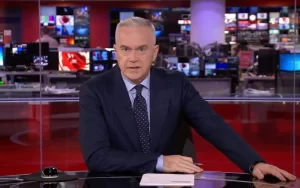Huw Edwards emerged as the BBC’s highest-paid journalist last year, earning £480,000 despite being suspended for nine months. The annual report reveals that Edwards received a £40,000 pay rise, making him the corporation’s third-highest earner.
Suspended in July 2023 over allegations of paying a young man for explicit images, Edwards did not resign until April, citing medical reasons. During this period, he was contracted to present 160 days’ worth of BBC One news bulletins, including news and election specials, along with other programming.
Gary Lineker remains the BBC’s top earner with an unchanged salary of £1.35 million. Radio 2’s Zoe Ball follows, with her salary slightly reduced to £950,000. Nick Robinson saw the most significant increase, entering the top 10 highest earners due to his BBC podcast work. His salary jumped from £280,000 to £350,000 following the launch of The Today Podcast. The combined salary for Today programme presenters now totals £1.56 million, up from £1.49 million the previous year.
All but a few presenters received pay increases last year. The BBC is mandated to publish salaries exceeding £178,000 from licence fee revenue. New entries include former weather presenter turned radio DJ Owain Wyn Evans, who now earns £200,000. Vernon Kay, replacing Ken Bruce as Radio 2’s mid-morning DJ, enters the list with a salary of £325,000, while Gary Davies joins with a salary of £205,000.
Edwards ranks behind Radio 1 Breakfast Show host Greg James (£420,000) and Fiona Bruce (£410,000), who hosts Question Time and BBC news bulletins. Bruce’s full pay, including Antiques Roadshow, is significantly higher.
Tim Davie, the director-general, defended continuing Edwards’ pay. “We’re always trying to be judicious with the spending of public money and we do not want to waste a single pound,” Davie said. “From the outset, we tried to act proportionately, fairly and navigate this appropriately. I think that’s what we did.” He emphasised that Edwards’ contract was agreed before the scandal broke.
Edwards also carried out after-dinner speaking and hosted awards evenings like our own Business Champion Awards in both 2022 and 2023.
The report also disclosed that half a million people stopped paying their licence fees last year, causing an £80 million drop in income. Despite the decline in fee payers from 24.4 million to 23.9 million, BBC’s chief operating officer Leigh Tavaziva maintained that the licence fee “continues to offer excellent value for money.”
Davie highlighted hit shows such as Gladiators, Blue Lights, and Once Upon A Time In Northern Ireland as examples of the corporation’s “sustained creative excellence.” He acknowledged challenging times ahead and announced that 500 posts would be cut by March 2026 as part of a “streamlining” effort.
The report indicated that the BBC failed to meet its performance targets for reaching young audiences, with only 71 per cent of 16-34-year-olds using BBC services weekly, falling short of the 75 per cent target. For under-16s, the figure was 69 per cent, and 85 per cent for those aged 16+.
Additionally, the report revealed an increase in formal cases of sexual harassment and bullying, rising from 34 to 50. The average time to close a case increased from 69 days to 101 days.
Read more:
Huw Edwards jumps to third-highest BBC earner despite scandal

